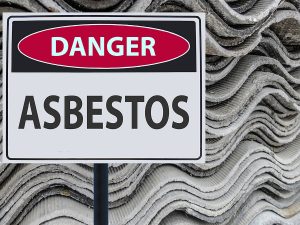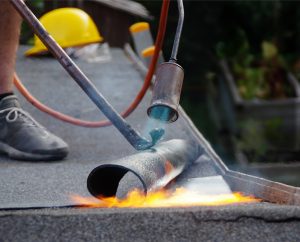The maintenance of a roof is complicated, even more so with commercial roofing systems. Commercial roofing systems differ from residential roofing systems for good reason. The problems that commercial building owners face are unique, so the solutions are unique as well. We’ve already reviewed some types of commercial roofing before. Let’s continue that talk today.
Types Of Commercial Roofing Systems: Flat Vs Sloped Or Pitched
One factor to keep in mind when choosing the right commercial roofing system is that commercial roofing systems are flat or low slope roofs. Steeply pitched roofs that are common for residential properties in many areas.
For commercial roofing, you have three options:
- Low Slope Roofs – These roofing systems have a pitch or rise of less than one foot.
- Flat Roofs – Flat roofing systems are (almost) completely flat.
- Steep Slope Roofs – These roofs have a pitch or rise of over 12 inches.
Low Slope Roofs
We define low slope roofs as roofs that have a pitch or rise of fewer than 12 inches total. Therefore, each foot of the roof rises approximately 3 inches. Anything more extreme than that is a steep slope. Be aware that even a “flat” roof isn’t completely flat and will have some sort of incline.
Each type of commercial roofing system has some unique advantages.
This type of roof allows for water runoff. They are also easier and safer for roofing company workers to repair. Additionally, they are less costly than steep-sloped roofs since the surface area is smaller. It is relatively easy to add in air conditioners, vents, solar panels, surveillance systems, and any other extras you might need or want.
However, low-sloped roofing systems may be compromised by the weight of heavy snow and ice. Because of this, you need to keep your climate and building codes in mind.
Flat Roofs
Flat roofing systems use the same materials as low-sloped roofing systems, and there are some distinct advantages to a flat roof as well.
They are fairly cost-effective since they have the smallest surface area. They are often the cheapest to maintain, repair, and install. Flat roofs are perhaps the simplest type of roof to add mechanical systems like HVAC systems, solar panels, or other necessities.
Generally, we use single-ply roofing systems like PVC, TVP, EDPM, tar and gravel, built-up roofing, or modified bitumen for both flat roofing and low sloped roofing systems. A light-colored flat or low-sloped roof can also reflect light. This helps to make your building more energy-efficient.
One disadvantage of a flat roofing system is that they offer poor water drainage. This may cause damage and problems resulting from standing water.
Steep Sloped Roofs
Steep sloped roofs are likely the least common option for commercial roofs. However, they can be an option depending on the type of commercial building you have and the sort of business that you operate.
Steeply pitched roofing systems offer the advantage of greater water, snow, and ice runoff. This can reduce the need for commercial roof repairs and maintenance.
That said, if repairs need to take place, steeper roofing systems may be more difficult for your roofing contractors to perform and therefore more expensive to fix.
More Considerations
One more thing to note is that installing a low sloped or flat roof means that not only will your roof be less visible from the outside, but that you’ll want to choose different materials to avoid storm damage and water intrusion. That can lead to leaks, mold, mildew, compromised structural integrity, and even damage to anything that you have inside your commercial building.
You want to ensure that the type of roofing system that you choose will help protect the structural integrity of your building. If you own an office building or something similar, then this may not be as much of an issue. A factory or manufacturing facility, or restaurant, may require some additional consideration.
And of course, commercial roofing systems focus on durability, reliability, and utility as opposed to aesthetics, in most cases. However, for commercial buildings in more consumer-facing or public areas, the look of the roof matters more and may require an investment in style and utility.
Other Add-Ons
Installing solar panels on your commercial roof to help power your operations and provide some green or eco-friendly energy to your business.
Ask your commercial roofing contractors about their capabilities with solar panels and other green energy solutions if you think they might apply to your particular roofing situation.
Other add-ons to your new commercial roofing systems include new HVAC systems, skylights, plumbing systems, satellite dishes, antennas, surveillance cameras, and more.
Similarities and Differences Between Commercial and Residential Roofing
The biggest difference between commercial roofing systems and residential roofing systems is what materials are available and commonly used in each market. In addition, commercial roofs are more likely to be flat, low-sloped, or otherwise more utilitarian. Residential properties tend to have more design flourishes and details–but of course, every property is different!
For instance, residential roofing options are typically asphalt shingles, cedar or wood shingles or shakes, concrete or clay tile, or even slate. This is all depending on the style of the home, the climate, and the homeowner’s budget.
While asphalt shingles are also a common selection for commercial roofing systems, some more popular choices include sprayed polyurethane foam, modified bitumen, restoration coatings, metal, concrete tile, built-up, tar and gravel, and single-ply roofing membrane systems made of TPO, PVC, or EPDM rubber roofing.
Final Thoughts
As you can see, when deciding on a new roof or roof replacement for your commercial property, there are a lot of options to choose from.
All of this means that when you are researching commercial roofing products and contractors or roofing companies to install them, forget about what you may know from replacing or repairing your home’s roofing system. Most of the requirements and options are rather dissimilar. How we install, replace, repair, maintain, and service commercial roofing systems is entirely different than residential.
Call us at 636-699-0449 today to get started.





